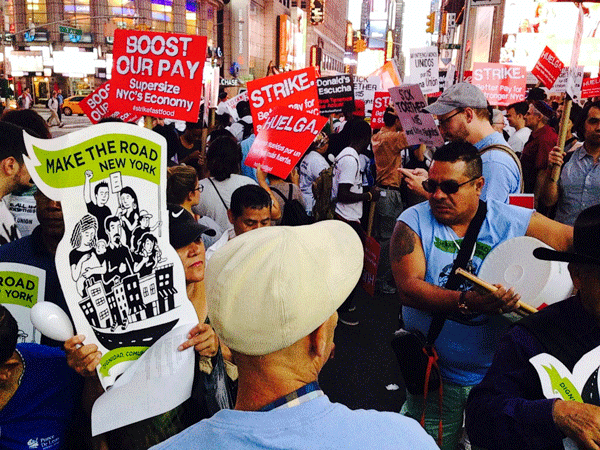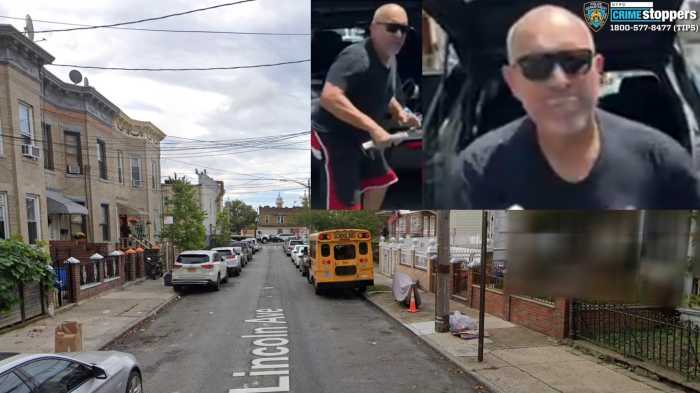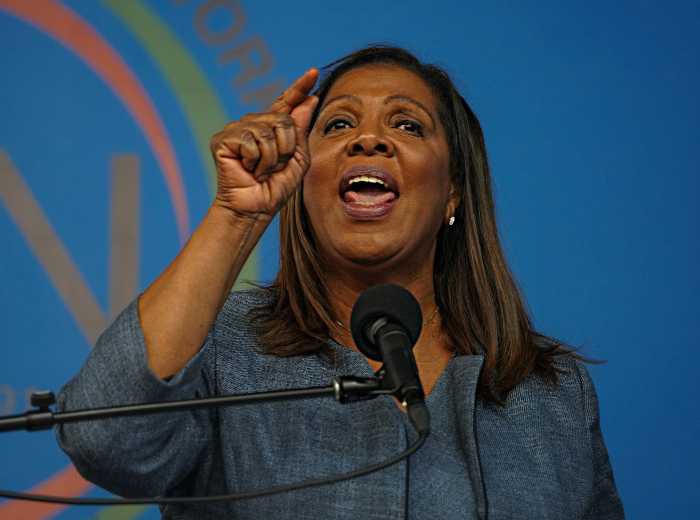
BY GERARAD FLYNN | Jumal Tarber is a 35-year-old worker at a McDonald’s in Midtown, Manhattan. He’s got a 5-year-old daughter, Danae, and would love to take her to Disney World sometime.
However, he can’t. While his daughter lives elsewhere, he rents a room and works five days a week, earning $8 an hour, leaving him, he said, to make some tough decisions.
“Me, personally, I have to pick from food or transportation to get to work,” he said.
For now, Disneyland is a distant dream.
But that’s not all that’s wrong with his job, where he has worked for more than two years. He only recently got three sick days, and gets no vacation time at all, another reason why his daughter won’t be seeing Mickey Mouse anytime soon, except maybe in a storefront.
Tarber wants his employer to hike his wages to $15 an hour because he says, in one of the world’s most expensive cities, you can’t live on that. And so he was among protestors in Midtown Thursday, campaigning for a higher wage — and a union.
A union, he said, is desperately needed, for a number of reasons. For starters, a general manager can get personal with an employee, who has little recourse but to take it, something an arbitrating union could mitigate, he said.
“No union means no backbone. You don’t have no support,” Tarber explained. “So if something is to happen, like a dispute with a manager over something personal that has nothing to do with work, the manager can write you up.”
But he’s witnessed worse, he said.
“They do a lot of discrimination,” he stated. “Women at my job feel scared to talk because the G.M. says stuff at the store that is inappropriate, and female employees are scared to speak out about sexual discrimination because they are afraid to lose their jobs.”
He added that if a more affordable city like Seattle can raise its minimum wage to $15 an hour, a wealthy city like New York should, too.
Hundreds took part in Thursday’s action in Times Square, with 19 reportedly arrested for disorderly conduct for sitting down in the street. That demonstration followed speak-ins at St. Mark’s and Judson churches on Aug. 31 as part of a “labor in the pulpits,” according to Reverend Winnie Varghese, of St. Mark’s.
A fast-food worker with Kentucky Fried Chicken in Brooklyn told the East Village congregation of the great uncertainty she faces, echoing Tarber’s words that without union protection one’s hours can be reduced without notice, often a way to make a worker quit.
“As people of faith, we believe we should be able to live with dignity in this city,” Varghese said. “And it is particularly appalling that people working 40 hours a week cannot meet their basic needs.”
But the campaign has been running into resistance from the industry and franchise owners.
Jack Mazloom, a spokesperson for the National Federation of Independent Business, said the notion that this campaign is about pitting workers against big, powerful corporations is “misleading in seeking to persuade the American public about big corporations and their excess profits.”
Keeping in line with the industry’s position, he said that many franchises aren’t owned by big corporations, but operate as small businesses and can’t afford such a hike. Close to 90 percent of McDonald’s stores in the U.S. are franchises, he noted.
Mazloom put The Villager in touch with Randall Bradley, who operates two Burger King franchises in Missouri and Iowa.
“I am a franchise, which means I am an independent operator,” Bradley explained. “Burger King has nothing to do with whether I make it or break it on my own. I pay a royalty fee and I pay into the national advertising fund and that’s my cost for being able to use the Burger King brand. I pay regardless of if I make money or not.
“I would love to increase their wages to $15 per hour,” he said of his workers. “But that would be about four times what I make in profit and at that increased cost I would go bankrupt.”
However, a July ruling by the federal National Labor Relations Board seriously challenges McDonald’s assertion that it lacks authority over issues like setting minimum wage.
To reach a decision that can have wide-reaching effects on the fast-food industry, a long legal road must be traveled. However, the Los Angeles Times reported that the N.L.R.B. general counsel ruled the federal agency will treat McDonald’s as the workers’ “joint employer.”




































